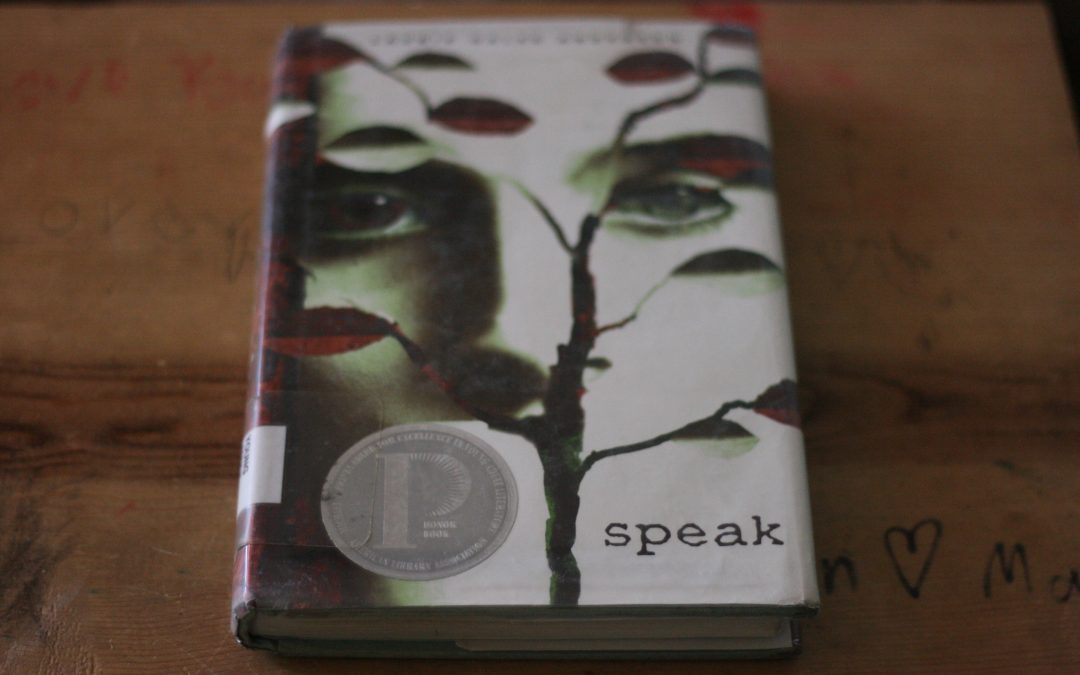I’ve been sitting on this book for a while, because I could not find words to accurately describe it. And even now, the only ones I can come up with are lovely, jarring, and hopeful.
They might seem like contradictory terms to use, but that’s because Speak, by Laurie Halse Anderson, a Printz Honor book, dealt with a tough subject: teenage rape. It evokes a sense of dread, followed by a sense of sorrow, followed by a small glimmer of hope for a girl who would stand up for herself against those who believe that a girl’s body is made to be used.
My love for this book might be explained somewhat because I was, at the same time, reading Jon Krakauer’s Missoula: Rape and the Justice System in a College Town. This is a big deal. And because I experienced two instances of near rape when I was a teenager and when I was a college student, Speak impacted me in a profound way.
Not to mention, Anderson is a master of language, intriguing character, and, even with such a heavy subject, humor. Melinda, the main character, was a spunky girl, in spite of what had happened to her. She did not refer to what had happened in the beginning, but you could feel it in an impending sense of trauma. I loved the tension of that and how much Melinda tried to overcome it on her own.
Here are three things I liked most about this book:
- The main character. As I’ve already mentioned, Melinda was spunky, even though she was depressed about the traumatic circumstances she’d had.
- The mystery. A bit of mystery was planted early, leaving the reader wondering why Melinda’s friends had all stopped talking to her. I love (and yet hate) when authors utilize this technique, because it makes the book very difficult to put down (and in my house if you can’t put down a book, there are all sorts of things that can happen in the meantime).
- The symbols. All throughout the book, Melinda was trying to get this tree right in her art class. It was a beautiful image, and in order to tell you why, I’d have to use spoilers, which I don’t want to do. So you’ll just have to read it for yourself.
Here’s an example of Melinda’s quirky, endearing personality, from the first line of the book:
“It is my first morning of high school. I have seven new notebooks, a skirt I hate, and a stomachache.”
And here’s one of my favorite parts:
“The first ten lies they tell you in high school
1. We are here to help you
2. You will have enough time to get to your class before the bell rings
3. The dress code will be enforced
4. No smoking is allowed on school grounds.
5. Our football team will win the championship this year.
6. We expect more of you here.
7. Guidance counselors are always available to listen.
8. Your schedule was created with your needs in mind.
9. Your locker combination is private.
10. These will be the years you look back on fondly.”
Anderson did a phenomenal job capturing life for a teenager and dealing with such a traumatic subject. It should be required reading to better understand rape culture and the propensity of victims toward silence (and Krakauer’s book mentioned above would be great, too).
The books mentioned above have affiliate links attached to it, which means I’ll get a small kick-back if you click on them and purchase. But I only recommend books I enjoy reading myself. Actually, I don’t even talk about books I didn’t enjoy. I’d rather forget I ever wasted time reading them. (But if you’re curious whether I’ve read something and what I thought about it, don’t hesitate to ask.)


